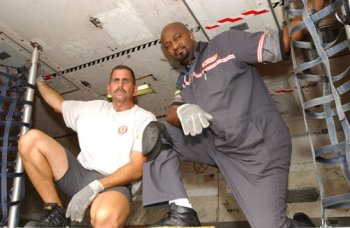
Texas Sen. Kay Bailey Hutchinson, left, and Mississippi Sen. Trent
Lott, right, are leading the effort to gut one of the nation's
oldest collective bargaining laws. Both sit on the powerful Senate
Commerce Committee, chaired by Arizona Senator John McCain. |
«
Contents
|
|
Mississippi Senator Trent Lott's mouth may have
prompted his exit from the national stage, but unionized rail
and airline employees have not heard the last of him.
With help from anti-labor lobbyists and conservative
lawmakers, Lott is pushing for a rewrite of the 1926 Railway
Labor Act, the landmark legislation providing bargaining rights
for air and rail employees.
Lott was part of a failed effort last year to bring similar
legislation to the floor of the Democratically-controlled
Senate. The bill would give an arbitrator selected by the
Secretary of Transportation the power to settle contract
disputes.
More importantly, the right to vote on contracts, and strike
if necessary, would be eliminated.
"No single change to U.S. labor law would have a greater
impact on as many employees," said IAM General Vice President
Robert Roach, Jr. "With nearly one million employees covered by
the Railway Labor Act, this has the potential to be a sweeping
setback."
With control of key House and Senate committees in Republican
hands, the bill's chances are considered better than ever. A
well-financed campaign to roll back the law is already underway.
The Air Transport Association (ATA), the airlines' trade
group and main lobbying arm, is leading the charge. Former ATA
president Carol Hallett routinely criticizes airline employee's
wages as excessive while American Airlines CEO Donald Carty
calls for an end to the "uncertainty" caused by employees' right
to vote on labor contracts.
A second industry front group, the Communities for Economic
Strength Through Aviation (CESTA), is barnstorming Capitol Hill,
calling for "reform" of the 77-year old labor law in the name of
everything from cheaper airfares to national security.
The group, headed by former Rep. Susan Molinari (R-NY), was
formed last year with the exclusive purpose of eliminating
employees' right to vote on contracts.

Proposed changes to the Railway Labor Act could strip
Northwest Airlines employees Rick Iacino, left, and Andrew
Carr,
right, of their right to vote on wages, benefits and
working
conditions.
U.S. Commission Says Law Works
In 1993, the Commission on the Future of
Worker-Management Relations, known as the Dunlop Commission,
examined U.S. labor laws, including the Railway Labor Act. After
a three-year investigation, the commission concluded the law
functioned as intended, giving both sides incentive to reach
consensual settlements.
The process is not without flaws. For years, U.S. rail and
airline unions have called for administrative changes to
accelerate the process, which allows long periods of superficial
bargaining and numerous countdown periods.
Not surprisingly, airline CEO's, their lobbyists and
legislators do not embrace the prospect of streamlining the act.
"With rare exception," said IAM President Tom Buffenbarger,
"railroad and airline management take advantage of the law's
loose language regarding prompt, good-faith bargaining."
Rather than support changes to improve the law's 97 percent
success rate, the industry is supporting an effort to
dramatically alter the law in its own favor.
"Since 1997, the National Mediation Board has resolved more
than 600 disputes without strikes or service interruptions,"
said GVP Roach.
"This latest attempt by conservative lawmakers and some
airline CEO's to 'fix' a law that is clearly not broken is
nothing but a smokescreen to give management a permanent
advantage at the bargaining table," said Roach. |
|

|